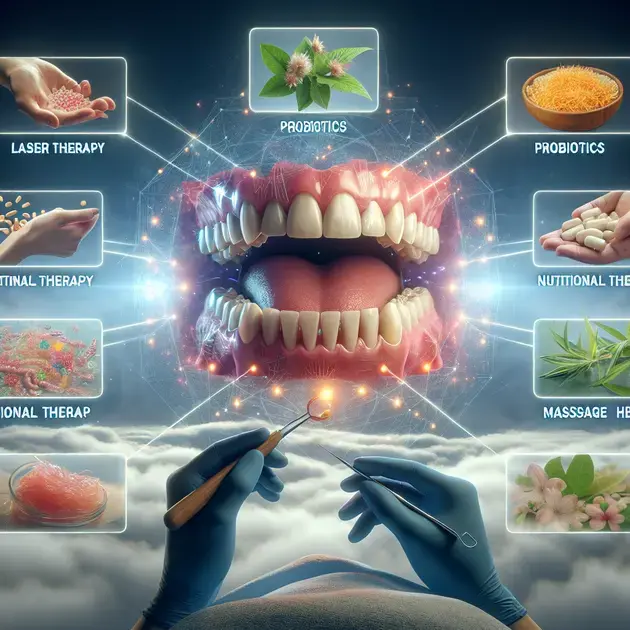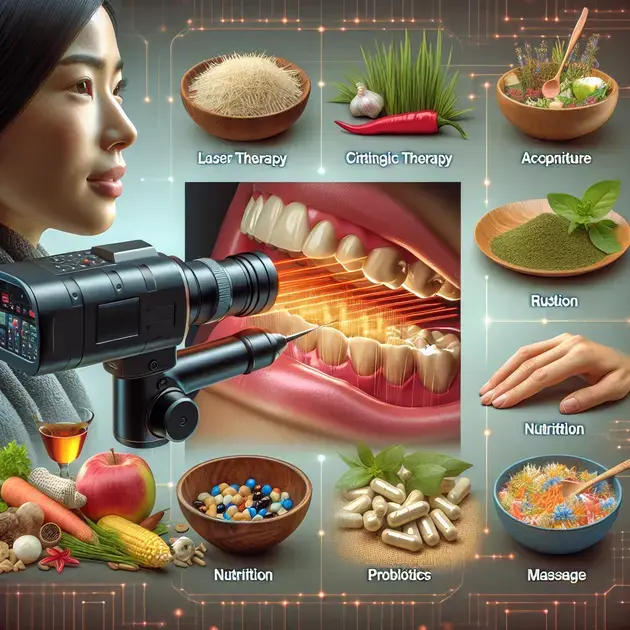Effective medication plays a crucial role in the treatment of periodontitis, a common inflammatory disease that affects the gums and bone supporting the teeth. Periodontitis, if left untreated, can lead to tooth loss and other serious health complications. It is essential to address this condition promptly with the most suitable treatment to prevent further damage.
With advancements in dental research, various effective medications have been developed to combat periodontitis. From antibiotics to antiseptic mouth rinses and prescription-strength toothpaste, there are several options available to help manage this condition. Choosing the right medication, in combination with professional dental care, can significantly improve the outcomes of periodontitis treatment and promote better oral health.

Choosing the Best Medication for Periodontitis Treatment
When it comes to selecting the best medication for periodontitis treatment, it’s essential to consult with a dental professional. Your dentist or periodontist will assess the severity of your condition and determine the most suitable treatment plan. In most cases, antibiotics are prescribed to combat the bacterial infection causing periodontitis. One common antibiotic is doxycycline, which can be taken orally or applied directly to the infected area.
To ensure you are choosing the most effective medication, it’s crucial to follow your dentist’s recommendations diligently. Additionally, researching reputable medical websites such as WebMD or Mayo Clinic can provide valuable information on the different types of medications available for periodontitis treatment. These sources offer comprehensive guides on the various antibiotics, their benefits, potential side effects, and dosage instructions.
Another crucial step in selecting the best medication is understanding your medical history and any allergies you may have. Inform your dentist about any previous adverse reactions to antibiotics or other medications to avoid complications. By providing accurate information about your health, you enable your dental care provider to make informed decisions regarding the most suitable medication for your periodontitis treatment.
Furthermore, staying informed about the latest advancements in periodontal medicine can help you make informed choices when selecting medication. Consider downloading the American Academy of Periodontology (AAP) app, which provides updated guidelines on periodontitis treatment and medication options. The app offers a wealth of resources, including articles, videos, and interactive tools to educate patients on periodontal health.
In conclusion, choosing the best medication for periodontitis treatment involves collaboration between you and your dental healthcare provider. By following their recommendations, researching reliable sources, disclosing your medical history, and staying informed about the latest medical advancements, you can optimize your periodontitis treatment and promote oral health.
Understanding the Role of Effective Medication in Managing Periodontitis
Effective medication plays a crucial role in managing periodontitis by targeting the root cause of the condition: bacterial infection. Antibiotics such as amoxicillin, metronidazole, or minocycline are commonly prescribed to eradicate the harmful bacteria in the gums and prevent further progression of periodontitis. These medications work by inhibiting the growth of bacteria and reducing inflammation in the affected areas.
To understand the significance of effective medication in managing periodontitis, it’s essential to follow a structured treatment plan outlined by your dental professional. This plan may include a combination of antibiotics, antimicrobial mouth rinses, and deep cleaning procedures to ensure comprehensive management of the condition. Adhering to the prescribed medication regimen and attending regular dental check-ups are vital steps in controlling periodontitis.
Additionally, understanding the potential side effects and contraindications of the prescribed medication is crucial for effective management of periodontitis. Websites such as Drugs.com or RxList provide detailed information on various medications, including their potential side effects, drug interactions, and proper usage guidelines. By familiarizing yourself with this information, you can ensure safe and effective use of the prescribed medication.
Monitoring your response to the medication and communicating any concerns or changes in your oral health to your dentist are key aspects of managing periodontitis effectively. Apps like Dental Drugs Guide offer comprehensive listings of periodontitis medications, dosage recommendations, and common side effects to help patients stay informed about their treatment.
In summary, understanding the role of effective medication in managing periodontitis involves a multifaceted approach that includes following the treatment plan, being aware of potential side effects, monitoring your response to the medication, and staying informed through reliable sources. By actively participating in your treatment and collaborating with your dental care provider, you can achieve optimal management of periodontitis and preserve your oral health.
Optimizing Periodontitis Treatment with the Right Medication
Optimizing periodontitis treatment involves selecting the right medication tailored to your specific needs and condition. The first step in this process is consulting with a periodontal specialist who can assess the extent of your periodontitis and recommend the most effective medication. Your periodontist may prescribe antibiotics, such as clindamycin or tetracycline, to target the bacteria causing gum disease and promote healing.
To optimize your periodontitis treatment with the right medication, it’s important to adhere to the prescribed dosage and duration recommended by your dental provider. Maintaining consistent use of the medication as directed can help eliminate the infection, reduce inflammation, and prevent periodontal complications. Websites like PubMed or the Journal of Periodontology offer research-based information on the efficacy of different medications for periodontitis treatment.
Another way to enhance the effectiveness of your medication is to incorporate good oral hygiene practices into your daily routine. Brushing and flossing regularly, using an antimicrobial mouthwash, and attending professional cleanings can complement the effects of the prescribed medication and improve treatment outcomes. Apps like Oral-B or Colgate provide interactive tools and guides for maintaining optimal oral hygiene during periodontitis treatment.
Monitoring your progress and communicating any concerns or changes in your symptoms to your periodontist are essential for optimizing treatment outcomes. By tracking your response to the medication, your dental provider can make necessary adjustments to the treatment plan and ensure that you are on the path to recovery. The Perio Protect app offers personalized support and tracking features for patients undergoing periodontitis treatment.
In conclusion, optimizing periodontitis treatment with the right medication involves a combination of tailored medication regimens, consistent oral hygiene practices, ongoing communication with your periodontist, and utilizing supportive resources. By taking a proactive approach to your treatment and leveraging available tools and information, you can enhance the effectiveness of your medication and achieve improved periodontal health.

**Exploring Alternative Approaches to Periodontitis Treatment**
Introduction
Periodontitis is a chronic inflammatory disease that affects the tissues surrounding the teeth. Traditional treatment approaches often involve scaling and root planing, antibiotics, and in severe cases, surgery. However, exploring alternative approaches to periodontitis treatment has become increasingly important in the field of dentistry. These alternative methods aim to provide effective yet less invasive options for managing and treating periodontitis.
Innovative Techniques
One alternative approach to periodontitis treatment is laser therapy. Laser technology can target and remove infected tissue while promoting the regeneration of healthy gums. This method is less painful and requires less downtime compared to traditional surgical procedures. Another innovative technique is the use of probiotics to restore the balance of oral microbiota. By introducing beneficial bacteria, probiotics can help prevent the overgrowth of harmful bacteria that contribute to periodontal disease.
Herbal Remedies
Some individuals may prefer to explore herbal remedies as a natural approach to managing periodontitis. For example, the use of aloe vera gel has shown anti-inflammatory properties that can help reduce gum inflammation. Other herbs such as tea tree oil and echinacea are also believed to have antimicrobial effects that could aid in controlling oral bacteria associated with periodontitis.
Nutritional Therapy
Another alternative approach is nutritional therapy, which focuses on the impact of diet on periodontal health. Consuming foods rich in antioxidants, such as fruits and vegetables, can help reduce oxidative stress and inflammation in the gums. Additionally, maintaining proper vitamin D levels has been linked to a lower risk of periodontitis. Integrating these dietary changes can support overall oral health and complement traditional treatment methods.
Acupuncture and Massage
Complementary therapies like acupuncture and massage have also gained attention as potential adjuncts to periodontitis treatment. Acupuncture can help improve blood circulation and reduce pain and inflammation in the gums. Similarly, gentle gum massages can promote circulation and relaxation, aiding in the healing process of periodontal tissues. These alternative approaches offer a holistic perspective on managing periodontitis.
Conclusion
In conclusion, exploring alternative approaches to periodontitis treatment offers a diverse range of options beyond traditional methods for managing this chronic inflammatory disease. Innovative techniques such as laser therapy and probiotics provide less invasive yet effective ways to address periodontal issues. Laser technology’s precision in targeting infected tissue and promoting gum regeneration, along with probiotics’ ability to restore oral microbiota balance, showcase promising advancements in the field of dentistry.
Additionally, herbal remedies like aloe vera gel, tea tree oil, and echinacea present natural anti-inflammatory and antimicrobial properties that can aid in reducing gum inflammation and controlling oral bacteria associated with periodontitis. These alternative methods offer individuals a more holistic and potentially gentler approach to managing their oral health.
Nutritional therapy focusing on antioxidant-rich foods and maintaining proper vitamin D levels demonstrates the significant impact diet can have on periodontal health. By incorporating dietary changes to reduce oxidative stress and inflammation in the gums, individuals can complement traditional treatment methods and support overall oral health.



